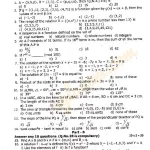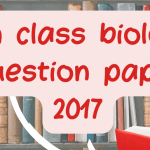Question: What is photosynthesis?
Answer: Photosynthesis is the process by which green plants make their own food using sunlight, water, and carbon dioxide.
Question: Which part of the plant carries out photosynthesis?
Answer: The leaves of a plant carry out photosynthesis.
Question: What are the raw materials for photosynthesis?
Answer: The raw materials for photosynthesis are carbon dioxide, water, and sunlight.
Question: Name the green pigment in leaves.
Answer: The green pigment in leaves is called chlorophyll.
Question: Why do plants release oxygen during photosynthesis?
Answer: Plants release oxygen as a by-product of the photosynthesis process.
Question: What is the role of chlorophyll in photosynthesis?
Answer: Chlorophyll absorbs sunlight, which provides the energy needed for photosynthesis.
Question: What is respiration in living organisms?
Answer: Respiration is the process by which organisms break down food to release energy.
Question: What gas is taken in during respiration?
Answer: Oxygen is taken in during respiration.
Question: What gas is released during respiration?
Answer: Carbon dioxide is released during respiration.
Question: How is breathing different from respiration?
Answer: Breathing is the physical act of taking in oxygen and releasing carbon dioxide, while respiration is a chemical process that releases energy from food.
Question: What are the types of respiration?
Answer: Respiration can be aerobic (with oxygen) or anaerobic (without oxygen).
Question: What is the function of red blood cells?
Answer: Red blood cells carry oxygen to different parts of the body.
Question: What do white blood cells do?
Answer: White blood cells help fight infections and protect the body from disease.
Question: What is the main function of the heart?
Answer: The heart pumps blood throughout the body.
Question: Which organ helps in filtering blood?
Answer: The kidneys filter waste products from the blood.
Question: What is digestion?
Answer: Digestion is the process of breaking down food into simpler substances that the body can use.
Question: Where does digestion begin?
Answer: Digestion begins in the mouth.
Question: What is the function of the stomach in digestion?
Answer: The stomach helps break down food with the help of digestive juices.
Question: What is the function of the small intestine?
Answer: The small intestine absorbs nutrients from the digested food.
Question: What is the role of saliva?
Answer: Saliva helps soften food and begins the process of digestion in the mouth.
Question: What is excretion?
Answer: Excretion is the removal of waste products from the body.
Question: Which organs are involved in excretion?
Answer: The kidneys, lungs, skin, and liver are involved in excretion.
Question: How do the lungs help in excretion?
Answer: The lungs remove carbon dioxide from the body when we breathe out.
Question: What is transpiration in plants?
Answer: Transpiration is the process of water loss from the leaves of plants.
Question: Why is transpiration important?
Answer: Transpiration helps in cooling the plant and in the movement of water and minerals.
Question: What is reproduction in living organisms?
Answer: Reproduction is the process by which living organisms produce their offspring.
Question: What is the difference between sexual and asexual reproduction?
Answer: Sexual reproduction involves two parents, while asexual reproduction involves only one parent.
Question: What is fertilization?
Answer: Fertilization is the fusion of male and female reproductive cells to form a new organism.
Question: Name one plant that reproduces asexually.
Answer: Potato is a plant that reproduces asexually through tubers.
Question: What are hormones?
Answer: Hormones are chemical substances produced in the body that control various functions.
Question: What is the function of insulin?
Answer: Insulin helps control the level of sugar in the blood.
Question: What are the components of the nervous system?
Answer: The brain, spinal cord, and nerves make up the nervous system.
Question: What is the function of the brain?
Answer: The brain controls all the activities of the body.
Question: What are sense organs?
Answer: Sense organs are organs that help us sense the world around us — eyes, ears, nose, tongue, and skin.
Question: What is an ecosystem?
Answer: An ecosystem is a community of living organisms interacting with their non-living environment.
Question: What is adaptation?
Answer: Adaptation is a change in an organism that helps it survive in its environment.
Question: Name one adaptation in desert animals.
Answer: Camels store fat in their humps and can survive without water for long periods.
Question: What is habitat?
Answer: A habitat is the natural home of an organism.
Question: What is pollution?
Answer: Pollution is the presence of harmful substances in the environment.
Question: Name one cause of air pollution.
Answer: Smoke from vehicles and factories is a major cause of air pollution.
Question: What is a food chain?
Answer: A food chain shows how energy is passed from one organism to another in an ecosystem.
Question: What are producers in a food chain?
Answer: Producers are green plants that make their own food and are the first level in a food chain.
Question: What are consumers?
Answer: Consumers are organisms that eat other organisms for energy.
Question: What are decomposers?
Answer: Decomposers break down dead plants and animals into simpler substances.
Question: What is deforestation?
Answer: Deforestation is the cutting down of trees in large numbers.
Question: Why is deforestation harmful?
Answer: Deforestation leads to loss of habitat, soil erosion, and contributes to climate change.
Question: What is a cell?
Answer: A cell is the smallest unit of life that makes up all living organisms.
Question: What is the function of the nucleus in a cell?
Answer: The nucleus controls the activities of the cell.
Question: What is the difference between plant and animal cells?
Answer: Plant cells have a cell wall and chloroplasts, while animal cells do not.
Question: Name one example of a unicellular organism.
Answer: Amoeba is a unicellular organism.
Question: What is the importance of maintaining hygiene?
Answer: Good hygiene helps prevent diseases and keeps us healthy.
Recommended Indian Books for Class 8 Biology Question Paper 2019 Preparation
-
Lakhmir Singh’s Science Class 8 – Biology
Author: Lakhmir Singh & Manjit Kaur
Publisher: S. Chand Publishing
Content: This book offers detailed explanations with diagrams, multiple choice questions, very short, short, and long answer type questions at the end of each chapter. It follows the NCERT pattern and is ideal for exam-oriented study. -
Science for Class 8 – Part 3 (Biology)
Author: P.S. Verma
Publisher: Arya Publications
Content: Contains topic-wise questions with explanatory answers, especially useful for revising chapters like reproduction, respiration, and ecosystems. Includes fill in the blanks, true/false, and HOTS questions. -
Together with Science Class 8 – Biology Section
Author: Rachna Sagar Editorial Team
Publisher: Rachna Sagar Pvt. Ltd.
Content: Offers chapter summaries, practice exercises, model test papers, and previous year-style questions. Best for pre-exam practice and time-bound solving. -
Oswaal Question Bank Class 8 Science – Biology
Author: Oswaal Editorial Board
Publisher: Oswaal Books
Content: Includes topic-wise question banks, mind maps, and detailed answer keys. Also covers case-based and competency-based questions from recent trends. -
CBSE Chapterwise Biology Class 8 Questions
Author: Anurag Singh
Publisher: Full Marks Pvt. Ltd.
Content: Structured chapter-wise with multiple formats: match the column, short answers, diagram-based, and MCQs. Useful for quick revisions. -
ICSE Biology Question Bank for Class 8
Author: Avichal Publishing House Team
Publisher: Avichal Publishing Company
Content: Good for both concept building and exam readiness. It includes objective and subjective question sets based on past ICSE exam patterns. -
Class 8 Science Success Series – Biology Focus
Author: S. K. Aggarwal
Publisher: Arya Publications
Content: Emphasizes important diagrams, key notes, and high-weightage questions. Provides step-by-step answers ideal for scoring in structured exams. -
Evergreen Self-Study in Science Class 8 – Biology
Author: V.K. Jain
Publisher: Evergreen Publications
Content: Offers self-assessment tests, chapter-wise Q&A, and special practice papers. Especially helpful for self-learners and last-minute prep. -
Smart Score Science Class 8 – Biology Section
Author: Bharti Bhawan Editorial Team
Publisher: Bharti Bhawan
Content: Chapter summaries followed by a variety of questions including fill in the blanks, MCQs, and higher-order thinking skills questions. -
NCERT Science Exemplar Problems – Class 8 Biology
Author: NCERT Editorial Team
Publisher: NCERT
Content: A collection of application-based and analytical questions designed to strengthen conceptual understanding. No direct theory — pure Q&A. -
Brain Mapping Academy Class 8 Biology Workbook
Author: Brain Mapping Academy
Publisher: Brain Mapping Academy
Content: Great for Olympiad-level biology preparation. Focuses on diagrams, labeling, application-based questions, and logical reasoning. -
Science in Everyday Life Class 8 – Biology Chapters
Author: Shubhra Bhardwaj
Publisher: Oxford University Press
Content: Includes real-life examples, case studies, and practice exercises. Encourages thinking beyond textbook with thought-provoking questions. -
All-in-One Science Class 8 – Biology Section
Author: Arihant Experts
Publisher: Arihant Publications
Content: Comprehensive theory with solved and unsolved questions, including sample papers that reflect recent exam trends. -
Learning Science – Class 8 Biology
Author: Meera Gupta
Publisher: G.R. Bathla Publications
Content: Covers each chapter with summary notes, conceptual questions, and descriptive answer formats. Good for both school tests and annual exams. -
Target Science Class 8 – Biology Practice Book
Author: Rohit Malhotra
Publisher: Target Publications Pvt. Ltd.
Content: Focuses on practice through a variety of question formats like match the pairs, labeling diagrams, and reasoning-based Q&As. -
Pearson Science Class 8 – Biology Unit
Author: Vineeta Gupta
Publisher: Pearson Education
Content: Offers in-depth theory supported by well-structured exercises. Includes model test papers and projects. -
Xam Idea Science Class 8 – Biology Section
Author: VK Global Publications Editorial Board
Publisher: VK Global Publications
Content: A mix of theoretical and practical questions, very useful for students preparing for both objective and descriptive exams. -
Self-Practice Workbook Class 8 Science – Biology
Author: M.K. Sharma
Publisher: MBD Group
Content: Designed for home study and revision, it features worksheets, daily practice sets, and recap questions for each topic. -
Scholars Hub Class 8 Biology Practice Book
Author: Scholars Hub Team
Publisher: Scholars Hub
Content: Includes concept check exercises, skill-based questions, and test-yourself sections for every topic. -
Schoolmate Science Class 8 – Biology Workbook
Author: Neha Malhotra
Publisher: EduCart
Content: A student-friendly practice book with colorful diagrams, short answer questions, and objective tests aimed at reinforcing learning.
Biology Question Paper 2019 Class 8 – An In-Depth Guide for Smart Preparation
The biology question paper 2019 class 8 remains a valuable resource for students aiming to master the subject and improve their exam performance. Whether you’re preparing for your school exams or revising for a mid-year test, going through the previous year’s question paper can sharpen your understanding of key topics and improve your problem-solving skills.
The 2019 Class 8 Biology paper followed the pattern aligned with most national and state-level education boards. It emphasized conceptual clarity, application-based learning, and neat presentation. Questions in the paper were divided into short answers, long answers, and objective types, allowing a good mix for comprehensive evaluation.
One noticeable trend in the 2019 biology paper was the focus on chapters such as reproduction in animals, microorganisms, crop production and management, and cell structure and functions. These chapters not only appeared frequently in school assessments but also form the building blocks for higher-level biology. By solving past paper questions on these topics, students can gain a deeper understanding and identify weak areas for targeted revision.
For instance, the question paper included diagram-based questions asking students to label parts of a cell or the human digestive system. Such questions test both memory and the ability to interpret visuals correctly. To prepare well, students should practice drawing neat, labeled diagrams and understand the function of each part.
Another key area covered in the paper was conservation of plants and animals. This chapter is concept-heavy and often includes value-based questions, where students are asked to explain the importance of biodiversity or the impact of deforestation. Writing clear, well-organized answers with relevant examples can earn full marks in such questions.
The biology question paper 2019 class 8 also included reasoning-based questions that tested higher-order thinking skills. For example, questions like “Why do camels survive in deserts?” or “How do microorganisms help in nitrogen fixation?” required students to apply textbook knowledge to real-life contexts. Preparing for such questions means going beyond rote learning and building a solid conceptual foundation.
Experts recommend dividing your biology study sessions into manageable portions. Spend time reviewing previous year papers like the 2019 one, and identify recurring patterns in question types. Maintain a revision notebook with important definitions, key processes, and diagrams. Also, make use of mock tests and time-bound practice sessions to simulate the exam environment.
Another effective strategy is group discussion or peer learning. Explaining concepts like respiration, transpiration, or food chains to classmates is an excellent way to reinforce what you’ve learned. Practice answering questions out loud or teach a chapter to a friend — it’s a proven method to boost retention.
The 2019 paper also had objective questions such as fill in the blanks and true/false statements. These require precision, so pay close attention to terminology while studying. Students should regularly quiz themselves on terms like autotrophs, chloroplasts, anaerobic respiration, and excretion to stay sharp.
Ultimately, using the biology question paper 2019 class 8 as a tool can enhance both confidence and performance. It’s not just about memorizing — it’s about learning how to think like a biologist, even at the school level.
FAQ for Biology Question Paper 2019 Class 8
What type of questions were included in the biology question paper 2019 class 8?
The paper included a mix of multiple-choice questions, short answer questions, long answer questions, and diagram-based questions. It focused on testing understanding, application, and recall.
Which chapters were most important in the 2019 Class 8 biology paper?
Key chapters included Crop Production and Management, Microorganisms: Friend and Foe, Cell Structure and Functions, Reproduction in Animals, and Conservation of Plants and Animals.
Were diagrams a part of the 2019 Class 8 biology paper?
Yes, students were asked to draw or label diagrams such as parts of a plant cell, human digestive system, and life cycle of a frog. Diagram-based questions are common and carry significant marks.
How can I prepare using the 2019 biology question paper?
Start by solving the entire paper in exam-like conditions. Afterward, compare your answers with textbook content, identify your weak areas, and revise those topics thoroughly.
Are questions repeated from past papers in school exams?
While exact questions may not repeat, similar question patterns and concepts often do. Practicing the 2019 paper helps recognize frequently tested topics.
Is the 2019 question paper suitable for CBSE or ICSE students?
The paper aligns closely with CBSE guidelines but also helps ICSE students strengthen core biology concepts, especially if used alongside their syllabus.
What are the most scoring topics from the 2019 biology paper?
Topics like cell functions, reproduction in animals, and microorganisms tend to be high-scoring because they involve direct concepts, definitions, and diagrams.
Did the 2019 paper include application-based questions?
Yes, several questions required application of knowledge, such as explaining adaptations in desert animals or benefits of crop rotation.
Is it enough to study only from past question papers like 2019?
Past papers are a great tool, but they should be used alongside textbooks, class notes, and sample papers for thorough preparation.
How should I write long answers in biology exams?
Use clear headings, structured paragraphs, and include labeled diagrams if needed. Stick to the point and use scientific terms correctly.
Can I use the 2019 paper for quick revision before exams?
Absolutely. It’s perfect for reviewing key question types, practicing time management, and assessing your exam readiness.
Are there any case-study questions in the 2019 paper?
Though not many, a few questions required reading short scenarios and answering based on understanding, making it useful for developing critical thinking.
What skills does the biology question paper 2019 class 8 test?
It tests memory, understanding, application, analytical skills, and ability to communicate scientific ideas clearly.
Do I need to memorize all definitions for the exam?
You should know all key definitions, especially those related to cell organelles, respiration, and reproduction, as they are frequently asked directly.
How can I improve in diagram-based questions?
Practice drawing diagrams neatly with correct labeling. Even simple, clear sketches can help you score full marks if labeled accurately.
Latest Posts
- Step-by-step guide to download and apply for jee mains admit card 202
- Comprehensive 2025 government holidays and recruitment details for job seekers
- JEE Mains Admit Card 2025: Your Step-by-Step Guide to Downloading the Hall Ticket
- Everything You Need to Know About 2025 Government Holidays Recruitment
- Comprehensive Guide to rrb d group recruitment 2025 – Eligibility, Vacancies, and Application
- Detailed guide to nps trust recruitment 2025 vacancies, eligibility and apply process
- Comprehensive guide to hpcl recruitment 2025 notification, vacancies, and application process
- ignou bed admission 2025 complete recruitment guide with eligibility and process
- Comprehensive Guide to Indian Army Agniveer Recruitment 2025 Notification and Jobs
- Everything You Must Know About CBSE Board Exams 2025 Changes & New Rules






